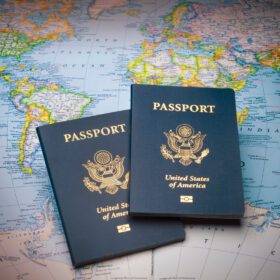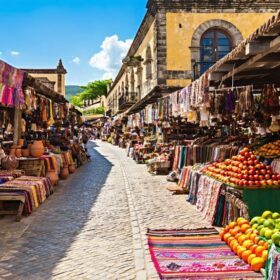Living Abroad as an Expat: Your Complete Guide to International Life
Recent Blog
Ready to explore the world?
Post Tags
Living Abroad as an Expat: Your Complete Guide to International Life
- Joseph Chanlatte
- Travel Blogs
Discover the ultimate guide to living abroad as an expat. From visa requirements to cultural integration, learn everything you need for a successful international relocation.
Picture this: You’re sipping your morning coffee on a sun-drenched terrace in Barcelona, checking emails from your New York office while planning a weekend trip to Morocco. Or maybe you’re navigating the neon-lit streets of Tokyo, finally understanding that the respectful bow your neighbor gives you each morning isn’t just politeness—it’s a gateway to a sense of belonging.
Living abroad as an expat isn’t just about changing your address; it’s about rewriting your entire life story. And trust me, after helping thousands of people make this leap, I can tell you it’s both the most thrilling and terrifying adventure you’ll ever embark on.
Whether you’re a digital nomad chasing the perfect work-life balance, a family seeking new opportunities, or someone simply craving a radical life change, expat life offers a unique blend of challenges and rewards that will fundamentally transform who you are. But here’s the thing nobody tells you: success abroad isn’t just about packing your bags and hoping for the best.
Table of Contents
ToggleTable of Contents
The Art of Choosing Your New Home: More Than Just Pretty Pictures
How do I choose which country to live in as an expat?
Choosing where to plant your expat roots is like dating—except the stakes are higher, and you can’t just ghost your way out of a bad situation. I’ve seen too many people fall for a destination’s Instagram-worthy facade only to find themselves homesick and overwhelmed three months later.
Start with your why. Are you chasing career opportunities? Seeking a lower cost of living? Wanting your kids to grow up multilingual? Your motivation will dramatically shape your destination choice.
Consider these best countries for expats:
- Portugal: Affordable living, excellent healthcare, and a growing expat community
- Singapore: Business-friendly environment with English widely spoken
- Mexico: Proximity to the US, vibrant culture, and affordable lifestyle
- Germany: Strong economy, work opportunities, and central European location
- Thailand: Low cost of living, tropical climate, and established expat infrastructure
But here’s my insider tip: Visit during the worst season first. Love Lisbon in February’s drizzle? You’ll adore it in May. Can you handle Bangkok’s sweltering August heat? You’re golden year-round.
What are the visa requirements for living abroad as an expat?
Work visas for expats are your golden ticket, but they’re not one-size-fits-all. Each country has its own bureaucratic maze, and navigating it requires patience, organization, and often a good lawyer.
Common visa types include:
- Work visas: Require job sponsorship
- Student visas: Perfect for career changers
- Investment visas: For those with significant capital
- Retirement visas: Age and income requirements vary
- Digital nomad visas: Increasingly popular for remote workers
Portugal’s Golden Visa program, for instance, requires a minimum investment of € 250,000 but offers EU residency. Meanwhile, Estonia’s digital nomad visa needs just proof of €3,500 monthly income. The key? Start your visa research at least 6-12 months before your planned move.
The Housing Hunt: Finding Your Home Away from Home
How can I find suitable housing in a new country?
Finding suitable housing abroad is like trying to solve a puzzle blindfolded—until you know the local tricks. Forget everything you know about apartment hunting back home; every country has its own quirks.
Your housing strategy should include:
- Short-term rentals first: Book an Airbnb for your first month while you explore neighborhoods
- Local platforms: Skip the international sites and use local property portals
- Network connections: Join expat Facebook groups and local housing forums
- Professional help: Consider hiring a local real estate agent who speaks your language
In Germany, you’ll need a Schufa credit report and often three months’ rent upfront. In Japan, gift money (reikin) to landlords is customary. In Spain, having a local guarantor can make or break your application.
Pro tip: Always view properties in person or via video call. That “cozy studio” might actually be a closet with delusions of grandeur.
The Money Talk: Budgeting for Your New Life
What is the typical cost of living abroad compared to my home country?
Cost of living abroad varies wildly, and your dollar (or euro, or pound) can either stretch like elastic or shrink like a wool sweater in hot water. Bangkok’s street food might cost $2, while Zurich’s basic lunch could set you back $25.
Here’s a reality check for popular expat destinations:
| Country | Monthly Budget (Single) | Monthly Budget (Family) | Housing % of Income |
|---|---|---|---|
| Portugal | $1,500-2,500 | $3,000-4,500 | 25-35% |
| Mexico | $800-1,500 | $1,800-3,000 | 20-30% |
| Singapore | $2,500-4,000 | $5,000-8,000 | 30-40% |
| Germany | $1,800-3,000 | $3,500-5,500 | 25-35% |
| Thailand | $600-1,200 | $1,500-2,500 | 20-30% |
Career Moves: Working Your Way Around the World

How do I secure a job or work remotely while living abroad?
Securing employment abroad requires strategy, patience, and often a willingness to start over. The good news? Remote work opportunities abroad have exploded, giving you unprecedented flexibility.
Your employment options include:
- Local employment: Full cultural immersion but potential salary adjustments
- Remote work: Keep your current job while exploring new cultures
- Freelancing: Ultimate flexibility but requires self-discipline
- Entrepreneurship: Start fresh in a new market
- International transfers: Leverage your current company’s global presence
For remote workers, invest in a VPN service (ExpressVPN and NordVPN are expat favorites) to access region-locked content and secure your connections. A portable Wi-Fi hotspot like Skyroam or GlocalMe ensures you’re never offline during crucial meetings.
The key to remote work success? Communicate your timezone clearly and over-communicate your availability. Your colleagues back home need to trust that you’re not just sipping mojitos on a beach (even if you occasionally are).
Healthcare and Wellness: Staying Healthy Far from Home
What healthcare options are available for expats?
Healthcare for expats can be either surprisingly affordable or shockingly expensive, depending on your destination and preparation. Universal healthcare systems like those in Portugal or Germany offer excellent coverage, while private systems require more planning.
Essential healthcare considerations:
- International health insurance: Cigna Global and Allianz Worldwide offer comprehensive expat coverage
- Local health insurance: Often required for residency
- Prescription transfers: Bring medical records and current prescriptions
- Emergency contacts: Know local emergency numbers and nearest hospitals
Travel insurance from providers like World Nomads or SafetyWing bridges the gap during your transition period. Don’t skimp on this—a single emergency room visit in the US can cost more than a year’s premium.
Tax Tango: Navigating Financial Obligations
How do I handle taxes when living abroad (US/foreign taxes)?
Expat tax advice isn’t just helpful—it’s essential. The US is one of the few countries that taxes citizens on worldwide income, regardless of residency. This creates a complex web of obligations that can trip up even the most organized expat.
Key tax considerations:
- Foreign Earned Income Exclusion: Excludes up to $112,000 (2022) of foreign income
- Foreign Tax Credit: Prevents double taxation
- Tax treaties: May reduce your tax burden
- Reporting requirements: FBAR and Form 8938 for foreign accounts
Professional help is non-negotiable. Hire a tax professional who specializes in expat taxes. The penalties for non-compliance can be severe, and the rules change regularly.
Culture Shock: The Emotional Rollercoaster
What are the challenges of integrating into a new culture and managing culture shock?
Culture shock hits differently than you expect. It’s not just about different food or customs—it’s about feeling like an alien in your own skin. You’ll go through stages: honeymoon phase, frustration, adjustment, and finally, adaptation.
Common culture shock triggers:
- Communication styles: Direct vs. indirect communication
- Time perception: “On time” means different things globally
- Social hierarchies: Workplace dynamics vary dramatically
- Personal space: What’s comfortable differs by culture
- Problem-solving approaches: Bureaucracy vs. efficiency
Managing homesickness abroad requires intentional strategies. Create routines that ground you, maintain connections with home, but also embrace local experiences. Join expat groups, but don’t let them become your only social circle.
Language Barriers: More Than Just Words
How do I manage language barriers in another country?
Language barriers go beyond vocabulary—they’re about cultural context, humor, and the subtle art of reading between the lines. Even in English-speaking countries, you’ll encounter regional dialects and cultural references that can leave you feeling lost.
Effective language strategies:
- Duolingo and language learning apps: Start before you move
- Local classes: Immersion accelerates learning
- Language exchange partners: Free practice with native speakers
- Professional language tutors: Faster progress for specific needs
- Language phrasebooks: Offline backup for essential phrases
Don’t underestimate non-verbal communication. A smile, gesture, or respectful attempt at the local language opens doors that perfect grammar can’t.
Building Your Tribe: Social Networks and Friendships
What are the best ways to make friends and build a social network as an expat?
Finding friends as an expat requires stepping outside your comfort zone repeatedly. The friends you make abroad often become your chosen family, understanding your journey in ways that folks back home simply can’t.
Proven friendship strategies:
- Join expat communities: Facebook groups, meetups, and local chapters
- Pursue hobbies: Join sports clubs, book clubs, or art classes
- Volunteer: Give back while meeting like-minded people
- Work connections: Cultivate relationships with colleagues
- Neighborhood involvement: Attend local events and festivals
The expat community can be your lifeline during tough times, but avoid the expat bubble entirely. Local friendships provide cultural insights and authentic experiences that transform tourists into residents.
Money Matters: Banking and Financial Management
How do I access banking and manage finances overseas?
Expat banking solutions have evolved dramatically. Gone are the days of carrying cash everywhere or paying outrageous fees for international transfers.
Modern banking essentials:
- International banks: HSBC, Citibank offer global services
- Local bank accounts: Essential for rent, utilities, and local transactions
- Digital banks: Revolut, Wise offer excellent exchange rates
- No foreign fee cards: Minimize transaction costs
- Money transfer services: Wise, Remitly for international transfers
Keep your home country accounts active initially. You’ll need them for credit history, emergency funds, and potential returns. A debit card from your home country serves as financial backup.
Education Abroad: Raising Global Citizens
What should I consider for my children’s education as an expat?
Moving abroad with family adds complexity but also incredible opportunities. International schools for expat children offer continuity and globally recognized curricula, but they come with premium price tags.
Educational options include:
- International schools: IB, American, or British curricula
- Local schools: Full immersion but potential language barriers
- Online schools: Flexibility but requires parental involvement
- Homeschooling: Complete control but limited social interaction
Consider your timeline. If you’re planning to return home, maintaining curriculum continuity becomes crucial. If you’re permanent residents, local schools might offer better cultural integration.
The Expat Essentials: Must-Have Tools and Resources
Success abroad often depends on having the right tools. Here are the expat essentials that can make or break your experience:
Technology Must-Haves:
- Kindle Paperwhite: Access to English books anywhere
- Universal power adapter: One device for all your electronics
- Noise-canceling headphones: Essential for travel and noisy environments
- AirTags or Tile trackers: Never lose your luggage again
Practical Essentials:
- Space-saver compression bags: Maximize luggage efficiency
- Command strips: Hang items without damaging rental properties
- Portable espresso maker: Comfort of home, anywhere
- Sleep sound machine: Adjust to new environments faster
Financial Tools:
- MyUS.com forwarding service: Access home country products
- International health insurance: Comprehensive coverage globally
- Smart luggage scale: Avoid overweight fees
The Retirement Dream: Golden Years Abroad
Retiring abroad as an expat offers the promise of affordable living, better weather, and new adventures. Popular retirement destinations like Portugal, Mexico, and Thailand offer retiree-friendly visas and established expat communities.
Retirement considerations:
- Healthcare accessibility: Proximity to quality medical care
- Cost of living: Stretch your retirement savings further
- Visa requirements: Long-term residency options
- Expat communities: Social support networks
- Climate preferences: Year-round comfort
The Reality Check: Pros and Cons of Living Abroad
Pros and cons of living abroad aren’t just talking points—they’re daily realities that shape your experience.
The undeniable benefits:
- Personal growth: Challenges force you to evolve
- Cultural enrichment: Expanded worldview and perspectives
- Career opportunities: Global experience enhances marketability
- Adventure: Every day brings new discoveries
- Financial advantages: Potentially lower cost of living
The honest challenges:
- Isolation: Distance from family and friends
- Bureaucracy: Visa renewals, tax obligations, legal complexities
- Career limitations: Some industries favor local experience
- Healthcare concerns: Navigating foreign medical systems
- Identity shifts: Questioning who you are in new contexts
Your Next Chapter Awaits
Living abroad as an expat isn’t just a change of address—it’s a complete life transformation. You’ll discover strengths you didn’t know you had, develop resilience you never thought possible, and create memories that will sustain you for decades.
The path isn’t always smooth. There will be days when you question your decision, when homesickness hits like a brick wall, when simple tasks feel insurmountable. But there will also be moments of pure magic—when you finally understand a local joke, when a stranger becomes a friend, when you realize you’re not just visiting anymore; you’re home.
The world is waiting for you. Whether you’re drawn to the bustling streets of Singapore, the laid-back beaches of Portugal, or the cultural richness of Mexico, your expat journey starts with a single step: deciding to take the leap.
Ready to write your own expat story? The adventure begins now. Research your destination, connect with local expat communities, and remember—every expert was once a beginner. Your future self will thank you for the courage to start.
Curious about where your passport stands — or dreaming of one that opens more doors?
Check out our latest post, [The Most Powerful Passports: Your Gateway to Global Freedom], where we break down the top-ranking travel documents in the world. Spoiler: Singapore holds the number one spot, giving its citizens access to an incredible number of visa-free destinations. If you’re considering expat life there or just fascinated by global mobility, this is one you won’t want to miss.
What’s holding you back? Share your expat dreams and concerns in the comments below. Let’s build a community of adventurers supporting each other’s journeys.
About the Author: This guide draws from extensive research and the experiences of thousands of expats who’ve successfully navigated the challenges of international living. Whether you’re taking your first steps abroad or looking to optimize your current expat experience, remember that every journey is unique, and your path will be entirely your own.
Affiliate Disclaimer: This article contains affiliate links, meaning I may earn a commission if you click through and make a purchase, at no extra cost to you.
Travel is one of the best gifts I’ve ever given myself, and I want others to experience that same magic. If you’re a travel enthusiast, the faveplus travel site is an all-in-one guide packed with real, actionable steps to help you get out there and explore the world.










